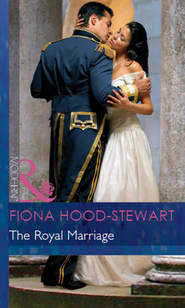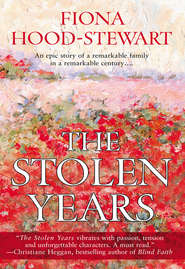По всем вопросам обращайтесь на: info@litportal.ru
(©) 2003-2024.
✖
At The French Baron's Bidding
Автор
Год написания книги
2019
Настройки чтения
Размер шрифта
Высота строк
Поля
Heart trembling, Natasha tried to wake her.
‘Grandmère,’ she murmured, gently touching her shoulder. ‘Please wake up.’ But she met with only silence. Horrified, her hands shaking, Natasha stood straighter and allowed the truth to sink in.
Her grandmother was dead.
CHAPTER TWO
THE early Norman chapel was filled with mourners, both local and foreign. Old retainers who had worked for the Comtesse for most of their lives lined the narrow road as the hearse made its way through the countryside. Natasha followed in the ancient Rolls, driven by Henri.
Now, as she stood alone in the front pew, dressed in black, listening to the priest read the funeral service, Natasha felt both sad and bewildered. She knew no one except for Henri and his wife Mathilde, standing respectfully in the pew behind her. Part of her shock was caused by the meeting she’d had this morning with the local notary who’d come to read her grandmother’s will. To her astonishment Natasha had learned that she was her grandmother’s sole beneficiary. She had inherited not only the château in Normandy, but the Comtesse’s sumptuous flat in the 16ième arrondissement in Paris, and her villa on the Côte d’Azur.
Natasha had gathered her thoughts and prepared to follow the coffin down the aisle when all at once she looked up and saw the man she’d encountered in the field, seated in the opposite pew. He looked different dressed in a dark suit and tie, with his hair groomed. Their eyes met and once more Natasha wondered who he was.
Then, turning away, she followed the pallbearers out of the church to the graveyard where the Comtesse would end her life’s journey, laid to rest among the ancient crooked headstones, many of which bore the name of Saugure upon them. As the coffin was lowered into the earth and the priest spoke the words she’d heard not that long ago when her parents were buried, Natasha experienced a moment of deep sadness and solitude.
Now she had no one left. Not even the estranged grandmother whom she’d hoped to get to know. Now she had only herself to count on.
Raoul d’Argentan stood a few steps away from the mourners, eyes fixed on the young woman standing next to the grave. Who was this granddaughter of the Comtesse de Saugure who had appeared out of nowhere on the day of her death? He knew, of course, that Marie Louise de Saugure had been estranged from her only son. But that all went back a long way. This, he supposed, must be his daughter. But what a strange coincidence that she should have returned only for her grandmother to die. Well, it was none of his business. The Saugures and the Argentans had been neighbours for several centuries and knew each other well. But their history had not always been pleasant. There were instances dating back a few hundred years, grievances that still rankled. Not that he cared. He had his own affairs to contend with: his auction house in Paris, which dealt in some of Europe’s finest art, and, of course, the estate to run.
As he walked back to his car Raoul supposed that he should pay his respects before his departure for Paris the next morning. It was only polite, after all, to offer his condolences. Though it seemed cynical when the girl obviously barely knew the woman who had left her a fortune.
As he drove off down the hill Raoul cast a quick glance in the rearview mirror. The mourners were leaving the graveyard and he glimpsed the woman once more. Whatever else she was, she was damn lovely, that was for sure.
Telling himself to stop being ridiculous—the last thing he needed was to find himself attracted to a Saugure—he pressed his foot on the accelerator and made his way back to his estate, determined not to think about the lovely wan face and that pair of limpid green eyes, which, despite every instinct, he’d felt strangely attracted to. He consoled himself with the fact that she was unattractively dressed, had no chic at all. In fact, he would go as far as saying she looked frumpy. With a shake of his head he headed back to his château and thought about the upcoming telephone call to New York that he needed to make.
‘Mademoiselle?’
‘Yes, Henri?’ Natasha looked up from the desk where she was going through some of her grandmother’s papers and smiled.
‘The Baron d’Argentan is here to offer his condolences.’
‘Right.’ She sighed, laying down the missive. Rising, she straightened her one black dress, realizing she simply must go into Deauville and acquire some suitable clothes. This was not the first neighbour come to pay their respects and satisfy their curiosity regarding the new owner of the Manoir, and she needed to dress accordingly. Better get used to it, she realized, following Henri across the hall to the formal drawing room where the butler liked to install the guests.
But, on stepping inside the room, Natasha felt her pulse leap when she recognized the tall figure silhouetted against the window. She was about to speak, then stopped, and swallowed.
‘I come to present my condolences,’ he said, in a haughty, rich baritone that seemed to resonate through the elegant room. Then he stepped forward and, raising Natasha’s fingers to his lips, bent his head towards them.
‘Thank you,’ she murmured, feeling her pulse pick up speed. His fingers felt strangely vibrant, as though an electric current were coursing through them. ‘Uh, do sit down,’ she said hurriedly, taking a step back and indicating the Louis Quinze chair opposite.
‘Thank you.’ He waited for her to sit, then followed suit. Natasha was relieved when the door opened and Henri entered with a bottle of champagne, which he proceeded to open.
‘I have not had the pleasure of your acquaintance,’ the Baron remarked, placing one leg over the other. ‘I wasn’t aware that the Comtesse had a granddaughter.’ He raised a quizzical black brow at her, as though questioning her authenticity. ‘I don’t seem to recall meeting you in the past.’
Natasha bristled and felt her cheeks flush, a flash of anger take hold. ‘That is because I haven’t been here for many years,’ she said coldly.
‘Aha. That would explain it.’
‘Yes.’
Natasha felt irritated with herself. Why was she allowing this stranger to make her feel ill at ease? She was, after all, in her own house now, for whatever that was worth.
They each accepted a glass of champagne from Henri and the Baron raised his. ‘To a very great lady. The Comtesse will be sorely missed in the region—won’t she, Henri?’ he said, addressing the butler.
‘Ah, oui, Monsieur le Baron, she most certainly will.’ Henri nodded in agreement. ‘But of course we are blessed to have mademoiselle,’ he added quickly.
‘Very true. This has come as rather a surprise to the community.’ The Baron twiddled his flute and studied her lazily.
‘I hope not an unwelcome one?’ Natasha retorted, her chin tilting upwards, anger at his high-handed manners and the idle way his eyes coursed over her increasing by the moment.
‘Unwelcome? Not at all. In fact, quite the opposite. You will be a breath of fresh air. That is if you plan to stay here?’ Again the brow flew up. It was as though he were searching for something amiss, something untoward.
‘It is far too soon for me to decide what to do. I haven’t made up my mind yet,’ she responded, hoping her tone would dampen any other questions. Yet part of her wanted him to believe her, resented that he should find anything suspicious about her. For it was true. She hadn’t decided what to do with her new inheritance. Part of her wanted to run back to Africa, to the safety of her job. Yet another part, a part she hadn’t known existed before, was struck by a new sense of loyalty to her lineage and the duties that came with the inheritance. It was her grandmother’s personal letter to her that had struck a chord. You are the only Saugure left to continue the line… Incredibly, the old lady had expected her to assume all her responsibilities.
The Baron stayed for several more minutes, making polite small talk, then rose. ‘If there is anything I can help you with, Henri has my numbers. As you’ve probably gathered,’ he said, a sudden wicked smile curving his well-defined lips, ‘I am your neighbour.’
‘That much became pretty obvious the other day,’ she muttered dryly, smiling despite her initial desire to dislike him.
‘Yes, well, I’m sorry for the way I greeted you that day. It was rude and bad-mannered. I’m hoping that, to make up for it, you might come and dine with me one day. Perhaps I can bring you up to speed on the area.’ He took her hand and squeezed it in his, holding it slightly longer than necessary, and again Natasha experienced that same pulsating tingle.
‘That would be very nice,’ she accepted, surprising herself as she extricated her fingers from his.
‘Good. Then I’ll expect you tomorrow.’ He gave a satisfied nod.
‘I—I haven’t got my schedule here,’ she mumbled.
‘Oh? Your timetable is already very booked up?’ He smiled down at her, his dark eyes brimming with mirth.
Natasha blushed once more. ‘That’s not what I meant.’
‘Then in that case I’ll expect you at eight tomorrow evening. Henri will drive you.’ With a quick nod he turned on his heel and left the room.
‘Well,’ Natasha exclaimed under her breath as she walked to the window and let out a long huff. The man certainly didn’t lack nerve. Why, he was impossibly authoritarian. And, since she hadn’t refused, she was now stuck with having dinner with him. Which reminded her of her desperate need to buy some clothes. Not that it mattered what she looked like, she qualified hastily; he was just a neighbour, and quite a rude one at that. But still, for some inexplicable reason she wanted to look her best. Perhaps it was part of her new-found duty to her name. After all, she must keep up the family reputation.
What on earth had caused him to invite this dowdy-looking Englishwoman to dinner when he’d had every intention of leaving for Paris immediately? Raoul wondered as he drove down the driveway and out onto the country road beyond. It was nonsensical and stupid to delay his return to town. Particularly to dine with someone as un-chic as his new neighbour. The woman’s hair looked as if it hadn’t seen a hairdresser in years, and her clothes didn’t bear mentioning!
Perhaps, he concluded, shaking his head as he entered the castle gates, it was because he didn’t want to go back to Paris, where he would have to deal with another of Clothilde’s jealous rages.
Slowing the car to a halt in front of his massive oak front door, Raoul glanced at his mobile. Just as he’d thought, there were several missed calls from her. He rolled his eyes and huffed, passing a hand thoughtfully over his bronzed chin. He really must bring this relationship to an end. Apparently staying away for longer periods of time than he usually did wasn’t doing the trick. Raoul sighed and alighted from the car. Like most men, he hated facing disagreeable situations. And Clothilde was certainly that, with her hysterical scenes and childish moods. Why, he wondered, had he got involved with her in the first place?
Stepping into the morning breeze, Raoul watched as the stable boys led two of his favourite horses across the cobblestoned yard, then stood for a moment on the edge of the well, dropping a pebble inside. Why not admit to himself that he’d succumbed to Clothilde’s charm for the same reason he had all the others: because it was easier to date top models who shimmied in and out of his life than commit to anything more serious. At thirty-six he was a confirmed bachelor, and had no intention of changing his single status. Much to the disappointment of several mothers of suitable candidates to become the future Baroness d’Argentan.
His mouth took on a cynical twist. Women were ambitious gold-diggers, as he’d found out to his cost several years earlier. He would not repeat the mistake of falling for one again. And, speaking of gold-diggers, he reflected, making his way towards the medieval castle that had been in his family for centuries, perhaps Natasha de Saugure was yet another one. After all, this sudden arrival of hers was too damned coincidental to be mere fluke. He just hoped she hadn’t frightened her grandmother into having a heart attack.
But as he walked through the great hall Raoul realized with a smile that this was probably a foolish thought. He had known Marie Louise de Saugure since he was a child. If anyone had done the terrifying it could have been her. Still, he felt wary of Natasha. As he would be of any Saugure. Which was obviously why he’d felt the need to ask her to dine: to delve deeper into her motives for coming here in the first place. The more he could glean about her, the better; for the past had taught every member of his family to be wary of Saugure women.
And he was no exception.
CHAPTER THREE











